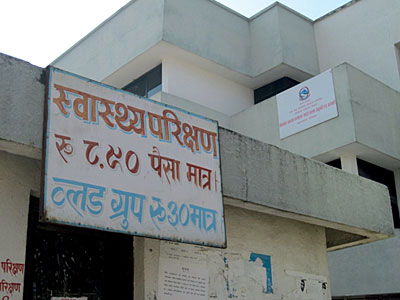 |
The board at the health check-up counter at the transportation department clearly states its charge as Rs 8.90. But the officer at the counter will demand Rs 10, and most will readily pay. Where does the Rs 1.10 go?
Our service providers have a persistent tendency to round off what's owed when we pay, but this hardly ever works out in the consumer's favour. Domestic airport tax is Rs 169.50 but passengers are charged Rs 170. Electricity bill of Rs 874.45? Accounting principles be damned, you are most likely to pay Rs 875, not Rs 874. At the petrol station, the attendant might ease off on the dispenser when the meter reaches Rs 874.43 and demand Rs 875, even though he could easily have gotten closer to giving you what you paid for.
To some, this might seem inevitable. Where are the coins for such small change anyway? But it's not just about getting back your mohars and sukas, we rarely get change of two or three rupees back, and when we do it might be in the form of a toffee you don't want (or at least not in that flavour). Often it's not even that; a pre-paid mobile recharge card may have an MRP of Rs 102, but the seller won't hand it over unless you pay Rs 105. We don't even question it because it seems petty. But if returning the correct change is such a hassle, why not charge a round figure in the first place? These odd figures allow vendors to openly cheat consumers.
What all these people are doing is 'penny-shaving', which is the fraudulent practice of stealing money over and over again in very small quantities. This is usually done by rounding off. But it doesn't take a genius to recognise that a rupee here and a rupee there can add up to very many rupees indeed. With 2.4 million customers for NCell, you can imagine how many rupees are being filched every day.
So what do we do? In principle, we have the right to get our money's worth, even the paisas. The nominal value of a rupee or a paisa should not be lost. It might be impossible give back the paisas in cash transactions but a rupee can certainly be returned. Perhaps a slow switch to plastic money, e-banking or mobile money is an option, through which you can pay the exact amount for your consumption.
As consumers, we have the basic right to be safe, to choose freely, to be heard and to be informed. The level of consumer awareness in Nepal is still low and the protection we have from the state is limited. The Consumer Protection Act 1997 needs to be updated to deal with modern-day consumer concerns. There isn't a specific platform where consumer complaints are heard, and we do not have a consumer court yet that can give quick judgments. Two years ago, the government instructed all stores to display a price list of all essential commodities because of variations among stores. But most retailers have simply ignored this directive.
As we celebrate World Consumer Rights Day this 15 March, let us move towards becoming aware and informed consumers. Don't quietly accept that candy unless you actually purchased it. Let's not pay for what we do not consume and if we do, demand to know where it goes. Unless you want them to, don't let them keep that change.
READ ALSO:
In a crunch



